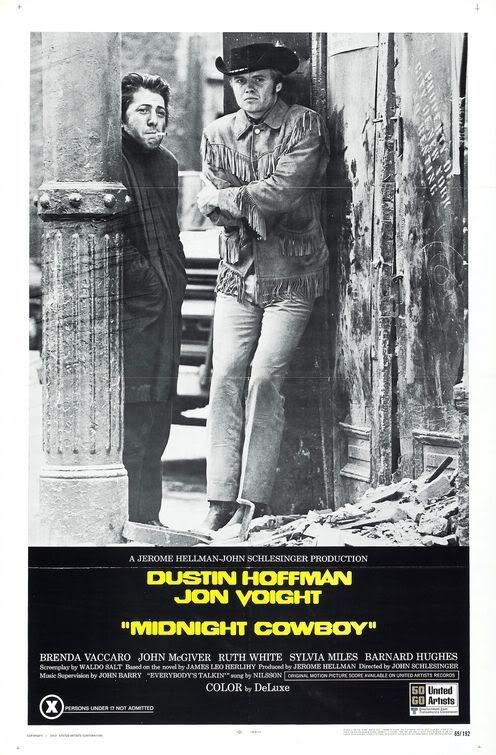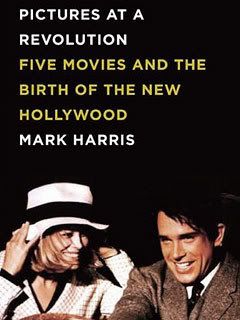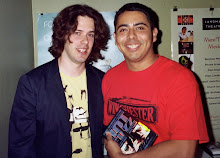Yesterday I posted a review of Mark Harris’ book, Pictures at a Revolution, about the film industry at the end of the Sixties. With so many changes going on both the world and Hollywood, the five films nominated for Best Picture in 1968 propelled American films forward into the Seventies, one of the most exciting decades in cinema. It’s my theorem that the great decades come every twenty years. The Thirties, the Fifties, the Seventies and the Nineties all have me looking forward to new movies in a few years time. Isn’t it interesting that forty years after those films, The Dark Knight is changing how we think about comic book movies, summer blockbusters and 70mm prints? But I digress…
I got Seventies on the brain so here are a few quick lists for those of you unfamiliar with the extraordinary films of that time. I’m talking about the teenagers who populate IMDB message boards and whose top ten lists include no films A) in black and white, B) older than fifty years OR C) more than two Tarantino films. So, here come some of my thoughts, in no particular order at all. Sorry, no pictures. If you’re not willing to read it all, sadly, this information is probably just what you need.
Top Five Movies from the 70’s
1. The Godfather/The Godfather Part II (1972/1974)
Sorry, but if Dark Knight reminds of us anything, it’s that these two films both stand the test of time and are almost always talked about as a pair. Brando, Pacino, DeNiro and Coppola, along with Gordon Willis, Nina Rota and many others created one of the consummate American myths.
2. One Flew Over the Cuckoo’s Nest (1975)
For anyone who has ever wanted to fight the system, Jack Nicholson fights for you in this movie. Whether he’s absconding mental patients for a fishing trip or watching a baseball game on a television set that isn’t even turned on, he has never been better, except in…
3. Chinatown (1974)
What can you say about this movie except that it’s like Mary Poppins. Practically perfect in everyway. Direction, acting, writing, camerawork, everything in this movie works together to achieve something that they just can’t seem to make anymore.
4. Taxi Driver (1976)
In the year of the Bicentennial, nobody had ever seen a film like this before and I don’t think we have since. Martin Scorsese, Paul Schrader and Robert DeNiro collaborate to tell a very disturbing, very involving story of alienation that grows more important every time I watch it.
5. French Connection (1971)
When does an action movie win Best Picture? When it is the precursor to all modern action cop films. Billy Freidkin directs Gene Hackman and Roy Scheider with shaky hand held cams, brutally realistic dialogue and yes, one of the greatest car chases ever.
My Five Favorite Movies from the 70’s
1. Young Frankenstein (1974)
My favorite Mel Brooks film, I can watch it over and over again. Plus, Gene Hackman is in it! “Sedagive?!”
2. Star Wars (1977)
Yes, the second one is the best, but we never would have had it without the first film. And who doesn’t want to leave home and join the Rebellion?
3. Alien (1979)
This film took science fiction in a different direction from the previous movie on this list and we are all better for it. And Ridley Scott gave us Sigourney Weaver in her underwear. Thank you, Sir Ridley.
4. A Clockwork Orange (1971)
I may be slightly disturbed for wanting to watch this movie over and over, but in my formative high school years, this film grabbed me with its style, then bashed me over the head with its message. I think I am better for it.
5. Apocalypse Now (1979)
Huh. Same thing goes for this one.
Top Five Films from the 70’s You Might Not Have Seen, But You Really Should.
1. The Conversation (1974)
Don’t want to go too much into this one, but Coppola + Hackman= Awesome.
2. Five Easy Pieces (1970)
Jack Nicholson is great again as Jack Nicholson, but he’s given so much great stuff to do in this script and turns in an ‘anti-Jack performance’ like we would not see again for thirty years.
3. The Last Detail (1973)
Another great Nicholson film, showing us how great he really was. Featuring a young Randy Quaid, it doesn’t really matter. Jack spits out Robert Towne’s profanity with such venom, he might pull out that horse cock and go upside your fucking head! “I am the motherfucking shore patrol, motherfucker!”
4. Mean Streets (1973)
The good thing about this film is that it’s one of those that even if you haven’t seen it, you probably have. Martin Scorsese’s first film with Robert DeNiro and second with Harvey Keitel, it works as a matter displacement device and puts you in Marty’s neighborhood of Little Italy with Johnny Boy, pool halls and The Rolling Stones.
5. The Last Picture Show (1971)
Another one of those ‘they-don’t-make-‘em-like-they-used-to’ films, every aspect of this film is excellent. It is an American masterpiece in the European style and universal in its appeal and endurance.
Five Films that Could Not Have Happened Without the 70’s
1. Boogie Nights (1997)
2. Jackie Brown (1997)
3. The Ice Storm (1997)
4. Zodiac (2007)
5. (tie) A Decade Under the Influence (2003) AND Easy Riders, Raging Bulls (2003)
Best Actor to Come Out of the 70’s
Gene Hackman – You need only look at the dreck of the past two decades produced by his counterparts DeNiro, Nicholson and Hoffman to see that when Hackman was in danger of succumbing to the same pitfalls, he stopped making movies.
Best Actor Who Never Made it out of the 70’s
John Cazale – He only made five films, including Dog Day Afternoon and Deer Hunter, before he passed away in 1978 from cancer.
Best Director to Come Out of the 70’s
Martin Scorsese – Fuck Spielberg, Marty is still the money. Robert Altman said before he died, “When’s the last time you got excited for a movie? Besides the newest Scorsese film?”
Best Director Who Never Really Made it out of the 70’s
Peter Bogdanovich - I love this man and his ascots. Probably known now for his work on The Sopranos, Peter is an accomplished writer, director and actor who never really rebounded from his failures as well as others. Luckily for us, he still does all three of those things very well.
What do you think readers? Give me some of your opinions.
 This post is part of the Film Ignorance Feature at Movies et al with a grade of 'Yep, It's A Classic.'
This post is part of the Film Ignorance Feature at Movies et al with a grade of 'Yep, It's A Classic.'





